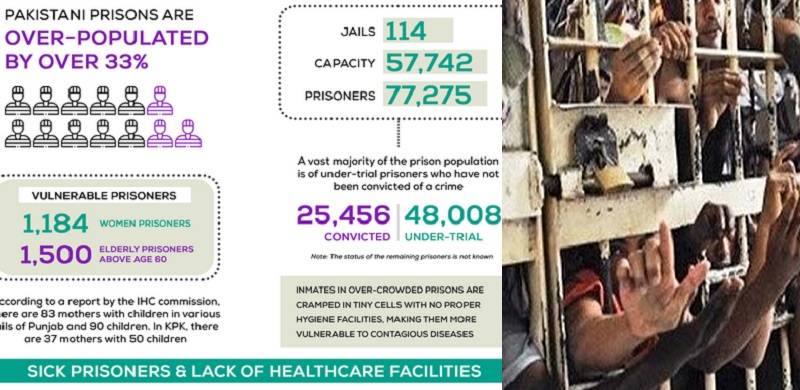
According to the Justice Project Pakistan (JPP), Pakistan faces a public health threat from its overcrowded prisons – which are not only filled far beyond their capacity with prisoners, but the overwhelming majority of them are under-trial and not yet convicted. 144 prisons across the country can only host 57,742 inmates. But they burdened with 77,275 prisoners.
The problem becomes even more worrying because judicial authorities, at least, seem well aware of the scale of the problem. The Islamabad High Court (IHC) Chief Justice Athar Minallah has called for issuing bail to prisoners of the overcrowded Adiala Jail who are facing trial for minor crimes, in order to prevent the spread of the novel Coronavirus. The Lahore High Court Chief Justice Qasim Khan took a similar stance, asking prison officials to prepare a list of prisoners who are serving minor sentences and prepare for issuing bail to such inmates.
The government, rather than seeing this as an opportunity to do what is both prudent and right, appears to be hesitant – in an all-too-familiar pattern that could prove costly in the middle of a global pandemic.
It is a great tragedy that in Pakistan, some crucial discussions on the penal system have to be framed in purely utilitarian terms – the ethical aspect being repugnant to many policy-makers and commentators alike in this Brave New World. And so, one must argue about the practical harm that this overcrowded prison system could do to the country during a dangerous pandemic, rather than pointing out the injustice of subjecting prisoners to conditions which endanger them.
Regardless of the nature of the argument that prevails, the fact is that a number of countries around the world are currently taking steps to ensure that their prison systems do not become horrific breeding-grounds for Covid-19. Turkey is among the countries which are releasing thousands of prisoners rather than risk subjecting them to conditions where the virus can thrive. There is currently an urgent discussion on this matter in the US and the UK – with growing warnings that crowded prisons will mean that “everyone will be infected” while incarcerated.
For reasons of common decency and human rights, both those of the prisoners and of the wider population outside the prison systems, it is important that the highest authorities in Pakistan take note of this danger. The rule of law and impartiality of justice can only be ensured by a state which acts with good sense when the times so require. And a global pandemic which has rendered even the most powerful countries of the world relatively helpless is precisely the situation where we must begin reassessing our basic priorities.
Even if one somehow agrees that the purpose of keeping these populations in prison is to protect the wider public and not just apathy or a desire for punitive misery, the authorities must weigh the demands of justice carefully. It would not be just to incubate a highly contagious and potentially deadly disease among prisoners – convicted and suspected alike – and then unleash it on the wider population.
All inmates involved in minor offences should be released forthwith, others can be freed on parole, and for those who cannot be released now should live in healthy conditions with appropriate social distancing measures.
